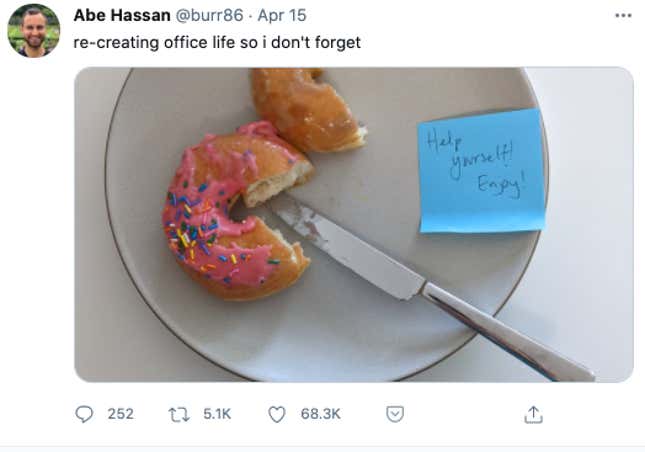A therapist once called me a garden-variety neurotic (a compliment), but that label hasn’t felt accurate lately.
All the talk about returning to work in the office has dialed up my anxiety to the point where I wonder if I’m approaching true disorder territory. I’ve been lucky enough that I could work remotely for the past year, but now I can’t imagine taking the subway to my office. My stomach seizes up when I picture myself before an elevator with two or three strangers already standing inside, waiting for me to step in. I also worry that everyone else will adapt to this next phase of the pandemic quickly, while I’ll still be paralyzed by fear. (The knowledge that I’ll be fully vaccinated when I go back should quiet these concerns, but my rational mind is not winning this mental power struggle.)
Sian Beilock, the president of Barnard College in New York and a cognitive scientist, has some comforting words for people like me: The dread I’m feeling right now may be the height of my anxiety. Her research has shown that when people are worried about something, “it’s the time right before it happens, where you see most of the anxiety play out,” she said when I contacted her for Quartz at Work. This was confirmed by a study that tracked subjects’ brain changes when they were told they were going to have to take a math test.
Other psychologists I spoke to recommended normalizing the anxiety, talking about any trauma of the past year (a tip aimed at managers too), planning what you might say to someone who has no respect for other people’s uneasiness so that you don’t get bulldozed into breaking your own rules for staying safe, and scrutinizing catastrophizing thoughts to divine facts from exaggerations. It will probably take about two weeks of being in the office to start feeling better, according to Vaile Wright, a clinical psychologist and senior director of healthcare innovation at the American Psychological Association (APA). After that, if you find yourself daydreaming, slacking off, or being snappish, you should seek actual counseling, she says.
Another of her observations: Some of the apprehension people are feeling is less about the virus than the threat of loss. First we grieved the office life we fled, and now we face abandoning the weird, comfortable, commuting-free routines we’ve built since shifting to working from home, which perhaps have allowed us to wring more time out of every day to care for ourselves and others. Indeed, a recent survey found that one third of US employees would quit rather than be forced to give up the right to work remotely. The task ahead for some of us may be separating pandemic fear from our own ambivalence about a return to “the grind.”—Lila MacLellan
Five things we learned this week
⚖️ We need to talk about the Derek Chauvin verdict at work. In the coming days, it will be crucial for managers and employers to support their Black employees, who may be experiencing a range of emotions about the trial for the murder of George Floyd. Get pointers here.
🌏 Nearly 20%of consumers will pay a premium for an Earth-friendly product. That’s why chief sustainability officers should view their work as part of a corporate strategy, and not just compliance.
🚙 Uber drivers in Nigeria and South Africa plan to follow London drivers’ playbook to win employee status. Their battle for fair pay and benefits reveals how much resistance the US model faces overseas.
👨🏻🦲 Jeff Bezos waxed philosophical in his last memo as Amazon’s CEO. He quoted biologist Richard Dawkins about “staving off death” and staying distinct, days before Dawkins distinguished himself for the wrong reasons.
🤷♀️ The pandemic has created more “ambiverts,” according to a new management book. A good thing, since those who blend extrovert and introvert traits make the best business leaders.
Remote work Tweet of the week
Abe Hassan, site reliability manager at Google in San Francisco, brought enough office donut humor for everyone.

30-second case study
Plenty of managers have reported feeling overworked and emotionally burnt out during the pandemic. Researchers from Germany, Australia, and the US studied the reasons why for a newly published paper analyzing stress, anxiety, and depression in more than 650 managers. Fortunately, they found signs of strife that reached clinical levels in only a fraction (5%) of their respondents, but another 10% experienced moderate to severe symptoms of distress.
The degree to which a leader’s mental health suffered could be predicted by their age, income level, and work status: unsurprisingly, younger, lower paid, and temporary managers were worse off than those who were older, highly paid, and securely employed. However, as Quartz’s Jackie Bischof explains, there was another factor that stood out as a driver of angst: “illegitimate tasks.” The more that a manager had to take on duties outside of their job description, or responsibilities for which they didn’t have the skills, the more likely they were to report a negative state of mind.
The takeaway: Middle managers have had to deal with the same shift to working from home as everyone else, but they’ve also been tasked with keeping their teams productive, motivated, and organized enough to collaborate effectively—sometimes across geographical distances and time zones that weren’t previously part of the puzzle.
Team leaders have had to probe how the pandemic was affecting their direct reports’ personal lives, even while it dramatically changed their own. They also have steered “the vitally important conversations around race and equality this year has prompted,” Bischof observes, but such discussions require training for sensitivity and conflict resolution. And soon they will also be expected to play a huge role in figuring a new workflow as more offices reopen.
According to the researchers, now is the time to rethink and rewrite managers’ job descriptions to determine what is legitimate or not, and to reassign or reframe duties as necessary. What managers need isn’t just empathy, but structural changes that will make their day-to-day more, well, manageable.
Pop quiz
What personality trait best predicts how well an employee will adapt to remote work?
- Introversion
- Agreeableness
- Openness
- Conscientiousness
- Neuroticism
(See the bottom of this email for the answer.)
Quartz field guide interlude
The billion-dollar question: How can small businesses come back better after the pandemic?
Over the past year, city residents and policymakers have found a new appreciation for small businesses of all kinds, understanding that they and their employees are essential to communities and to prosperity. Now that the public health crisis shows signs of subsiding, people and governments shouldn’t abandon that attitude, writes Quartz’s Tim Fernholz. Local and national governments can do more to bolster small businesses with the same tools they used during the pandemic. Technology adapted ad hoc for a crisis can increase efficiency and equity during boom times.
Read the rest of this story and more in our field guide, How Small Business Bounces Back.
Not yet ready to commit to a Quartz membership? How about a 7-day free trial?
It’s a fact
💄 “Mirror anxiety” explains why women experience more Zoom fatigue than men. A study based on surveys of nearly 10,600 people about their experience with Zoom meetings found that 1 in 7 women report feeling “very” or “extremely” fatigued after Zoom calls, compared to 1 in 20 men. After controlling for several factors, the researchers concluded that the exhaustion stems from the tendency of women to feel negative emotions after seeing themselves on screen.
Words of wisdom
“Work appropriately”—General Motors
We were already fans of the empowering two-word dress code that GM chief Mary Barra shared at a talk in 2018: dress appropriately. Now the company has followed up with the perfect two-word guideline for the corporate world of the future. “Work appropriately” is the company’s way of granting permission for individuals, teams, and managers to craft the right plan for productive hybrid or in-person work, and acknowledge that one size just won’t fit all.
Quiz answer
So, which trait predicts how well an employee will adapt to remote work? You got it right if you picked option 2, “agreeableness.”
Intuitively, it would seem that introverts would glide into a remote-work setup with little friction. Someone who doesn’t crave constant interaction would seem most likely to enjoy the solitude of a home office, whether during a quarantine or not. However, having a high degree of agreeableness was actually even more likely to allow a person to adapt to remote work, according to a team of researchers who published survey findings in Harvard Business Review last year.
They defined agreeableness as “a trait often associated with an individual’s proclivity toward maintaining positive relationships, feeling others’ emotions, sympathizing with others’ feelings, and being interested in others and their challenges.” Presumably, it’s likewise the attribute that people will also want to cultivate for the great return.
ICYMI
Playing office anthropologists two years ago, former Quartz journalists Georgia Frances King and Adam Pasick produced this hilarious and now nostalgic report on how various inhabitants of corporate spaces carry their laptops around the office, from the conference room to the cafeteria or around the water cooler. “What does your laptop-holding position say about you?” they asked. Are you a placeholder? A teddy bear hugger? A secretive insurance adjuster?
You got The Memo!
Our best wishes for a productive, purposeful week. Please send anti-anxiety tips, half-eaten donuts, and super short workplace mantras to [email protected]. Get the most out of Quartz by downloading our app and becoming a member. This week’s edition of The Memo was produced by Lila MacLellan and Heather Landy.
